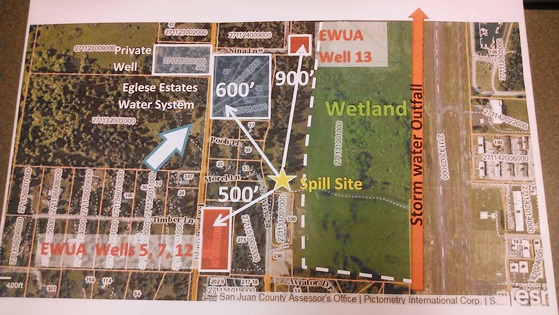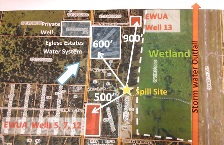— by Margie Doyle —

Graphic of the April 10 fuel spill at the end of Seaview Street (the airport runways are to the extreme right of the picture, provided by Paul Kamin.
At the April 16 meeting of the Eastsound Planning Review Committee, members of the public, County Councilman Rick Hughes, the county advisors on the EPRC, and property owners Brian and Mary Vanderyacht reviewed the recent gasoline fuel spill at the property owned by Vanderyacht Propane, Inc. at the north end of Seaview Street.
As with many aspects of life on Orcas, it’s complicated, in this case by questions of history, use, regulatory agency and permitting. The gasoline spill was from a truck owned by Island Petroleum Services, which is a tenant on the Vanderyacht property.
Neighbors who live within 135 feet of the property said their concerns were primarily, “how this got approved by county. What are the environmental risks as well as safety-wise? This really needs to be looked at.”
Property owner Brian Vanderyacht said, “We want to take care of our property, the last thing I want is something to happen to the neighborhood.” Vanderyacht Propane’s operations are permitted by the county and allowable in the Eastsound Sub-area’s service light industrial zone.
Clyde Duke, EPRC Chair, said that the property is used by two other “tenants” besides VanderYacht for:
1) Septic disposal pumping, including a 5,000 gallon above-ground tank for septic storage
2) Gasoline storage
It was explained that the gasoline storage is actually not technically ‘storage” because the storage tanks are on wheels and in transit, “which means [State Department of Transportation] rules apply” rather than fixed tank regulations.
Paul Kamin, Eastsound Water Users Association Manager said, “The Vanderyacht propane folks were good neighbors. The uses on that property that are not considered allowable uses for service light industrial… require a conditional use permit process and I don’t believe that was accomplished.”
Kamin added that the septic disposal and gasoline “storage” appear to be outside of the guidelines to protect the neighborhood.
EPRC member Fred Klein observed that only the propane storage tanks were brought before the EPRC for its review, “so the different businesses are piggy-backed” on the Vanderyacht property.
Vanderyacht said, “I’ll comply with whatever is necessary. As far as the tenants that moved in, [we did not discuss] whether or not they had permits.” Councilman Hughes said that, as in any business, tenant compliance with regulations is the responsibility of the property owner.
Orcas Port Manager Tony Simpson brought up that if further restrictions and environmental protections are made, there will be an expense that will be borne by customers. Further, restrictions must apply to all businesses in the same category.
When the issue of containment was brought up with respect to the cost of groundwater protection, the fact that propane is an atmospheric rather than a liquid quantity was brought out.
EPRC Member Ken Katz pointed out that within sewage and water treatment facilities are allowed in service light industrial areas, but not septic disposal.
EPRC member Gulliver Rankin reminded the group that there is still the opportunity to change existing uses under the Eastsound Sub-area Plan, but that “I don’t think they’ll retract businesses that have complied when they were permitted.”
Simpson inquired as to where there may be zoning for heavy industry or septic uses. Rural general zoning, such as by the landfill and the Orcas Transfer Station, allows such uses.
Klein said that in past years, propane storage was allowed in the center of Eastsound, where the public library now stands. “Moving [propane services ]to service light industrial was a coup at the time.”
Duke said, “The challenge is, we have a rural environment but we want the amenities of heat and fuel… and as a business owner, I know that we can’t mitigate risk.”
Orcas Fire and Rescue Acting Chief Mik Preyz addressed the group, saying, “The Fire Department also has questions and we’re looking at where to address them.” He announced that there has already been one meeting among those who helped mitigate the spill and that the group will meet again on April 27 to address their questions.
Paul Kamin has also prepared a list of questions which he gave to the EPRC and to the County Council.
Katz asked if a state department allows and permits a use, can it override local decisions about use and regulation. Hughes responded that local laws can be more restrictive than state laws for local jurisdictions: “The state can’t dictate zoning on a local level.”
Katz then asked if there is communication between state agencies, like the Department of Transportation, and county permitting agencies, like County Community Development and Planning. It appears that there is no such “automatic notification” system.
Rankin said, “There is no business license required in Eastsound for these things, no hoops to jump through. If there was, people would have a stated intention we’d all look at. We could also notice changes of use and could look at DOT or health department permits.
John Campbell, architect and member of the Eastsound Design Review Committee said, “We’ve always been aware that service light industrial [zoning] is close to residential zoning.”
Brian Vanderyacht said it had been “really hard” to locate property for his company’s propane storage. “The zoning was where it was. A gravel pit would be a great opportunity, the impact would be minimal.”
Citizens and EPRC members urged follow-up by the County; letters to the Council may be sent to San Juan County Council, 350 Court Street, #1 , Friday Harbor WA 98250 or emails to council@sanjuanco.com or phone at (360) 378-2898
**If you are reading theOrcasonian for free, thank your fellow islanders. If you would like to support theOrcasonian CLICK HERE to set your modestly-priced, voluntary subscription. Otherwise, no worries; we’re happy to share with you.**









It’s a shame that good thinking and planning seems to come as a knee-jerk reaction to an accident, or other unfortunate event. How can this be turned around to be a prevention move, rather than a reaction? Think tanks use brain storming, “thinking outside the box”; how about members of the EPRC and other influential groups using their intuitive powers, as well as their thinking brains? On the other hand, we’ll never know how successful the prevention technique is, because the accident would not happen.
Thank you again, Margie for the excellent reporting.
I believe that if state protetctions are stricter than county protections, state regulations DO trump county regulations, and Federal regulations DO trump state regs. County regulations CAN be stricter than state or federal ones – but if they are weaker and we (the citizenry) challenge the county regulations as being too lax to protect, then state and federal law trumps county law. My burning question (yes, i WILL be talking to DOE) is whether DOE has any power over DOT law, if these explosives and pollutants endanger ground water public safety, etc. I would imagine so and i intend to find out.
I would like to correct another misperception that state can’t dictate local zoning laws. When we re-did the CAO (Critical Areas Ordinance), it was found that the “under one acre” exemption which pretty much allowed piecmeal slaugher of Eastsound Swale was illegal all along. That is why it IS important to contact state regulatory agencies as citizen activists, if you disagree with county zoning laws that you believe are too lax, or unsafe. Always good to check… i sure wish i had! it might have saved some of Eastsound Swale.